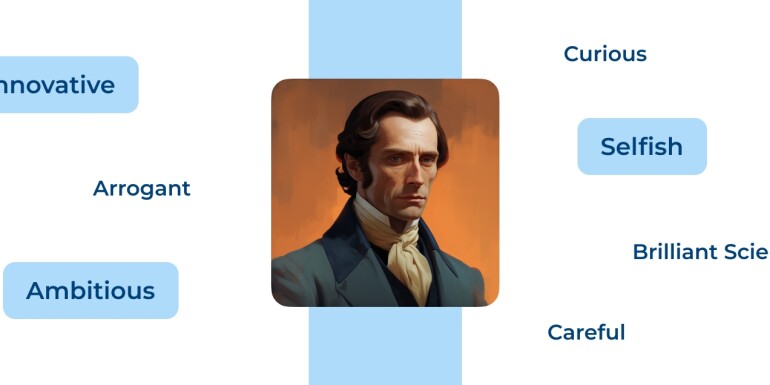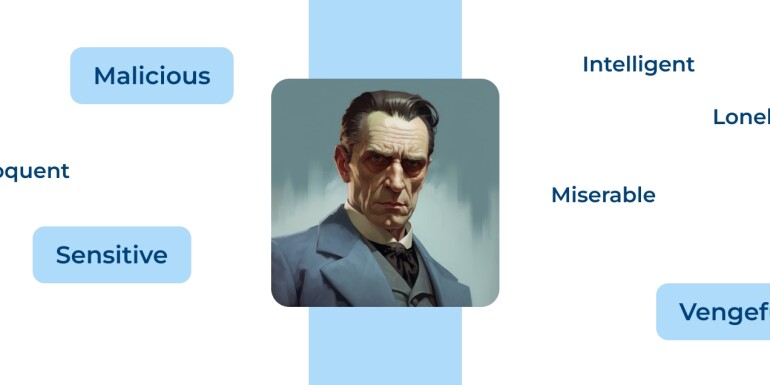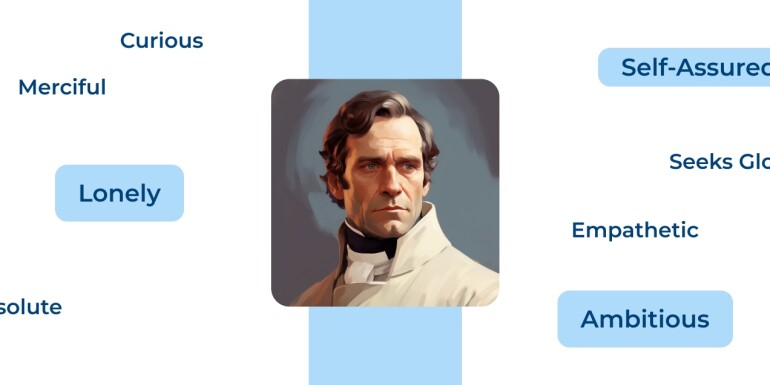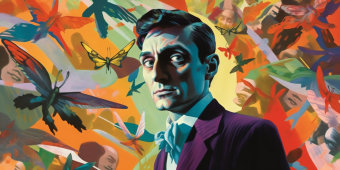by Mary Shelley


Frankenstein Characters Analysis
Table of contents
- Victor Frankenstein
- The Monster
- Robert Walton
- Elizabeth Lavenza
- Henry Clerval
- Alphonse Frankenstein
- William Frankenstein
- Justine Moritz
- Caroline Beaufort
- Peasants
- M. Waldman and M. Krempe
- Mr. Kirwin
Victor Frankenstein
Victor Frankenstein is the protagonist and narrator of the novel Frankenstein. He is an ambitious and intelligent young man who becomes obsessed with the idea of creating life. Victor is initially driven by curiosity and a desire to unlock the secrets of nature. However, his ambition turns into an obsession that ultimately leads to his downfall.

Victor Frankenstein is portrayed as a complex character with both positive and negative qualities. On one hand, he is a brilliant scientist who is passionate about his work. He is also deeply devoted to his family and friends. On the other hand, Victor's obsession with his creation leads him to neglect his relationships and responsibilities. He becomes consumed by guilt and remorse for his actions, but is ultimately unable to rectify his mistakes.
Victor in “Frankenstein” is depicted as a tragic hero who is destroyed by his own hubris. His arrogance and pride blind him to the consequences of his actions, and ultimately lead to the death of his loved ones. Victor's character is a cautionary tale about the dangers of unchecked ambition and the pursuit of knowledge at any cost.
The Monster
The Monster is the central antagonist of the novel Frankenstein. He is created by Victor Frankenstein and is initially portrayed as a hideous and monstrous creature. However, as the novel progresses, the Monster is revealed to be a complex and sympathetic character.

The Monster is a victim of circumstance, created by a scientist who abandons him and fails to provide him with guidance or love. As a result, the Monster is forced to navigate the world alone, without any understanding of human relationships or social norms. Despite his initial violence and aggression, the Monster is driven by a desire for acceptance and companionship.
In Frankenstein, The Monster is a symbol of the dangers of isolation and the importance of empathy and understanding. His character challenges the reader's assumptions about what it means to be human and raises questions about the nature of morality and responsibility.
Robert Walton
Robert Walton is the captain of the ship that rescues Victor Frankenstein in the Arctic at the end of the novel. He is also the recipient of the letters that make up the novel's framing narrative.

Walton in “Frankenstein” is a curious and ambitious explorer who is driven by a desire for knowledge and adventure. He is initially drawn to Victor's story because it represents the ultimate pursuit of scientific discovery. However, as the novel progresses, Walton becomes increasingly disillusioned with the consequences of unchecked ambition.
Walton's character serves as a foil to Victor Frankenstein. While both characters are driven by a desire for knowledge, Walton is ultimately able to recognize the dangers of his ambition and change course. His character represents the importance of empathy and humility in the pursuit of knowledge.
Elizabeth Lavenza
Elizabeth's character serves as a contrast to the monstrous and unnatural creation of Frankenstein's experiments. She represents the purity and goodness that Victor is ultimately unable to attain. However, Elizabeth's character is ultimately defined by her relationship to Victor, and she is unable to escape the tragic fate that befalls her as a result of his actions.
Elizabeth's character is a reflection of the limited roles available to women in the society of the novel. She is defined primarily by her relationships to the male characters, and her agency is limited by the constraints of gender roles. Despite this, Elizabeth in “Frankenstein” remains a sympathetic and compelling character who represents the hope and innocence that Victor ultimately destroys.
Henry Clerval
Henry in “Frankenstein” is Victor's best friend, who represents the novel's theme of friendship and loyalty. He is a kind and generous man, who is devoted to Victor and supportive of his endeavors. Henry Clerval's death is a tragic reminder of the consequences of Victor's actions.
Alphonse Frankenstein
Alphonse Frankenstein is Victor's father, who represents the novel's themes of family and responsibility. He is a loving and caring man, who is deeply concerned for his son's well-being. Alphonse's death is a tragic reminder of the consequences of Victor's actions.
William Frankenstein
William Frankenstein is Victor's younger brother, who represents the novel's themes of innocence and corruption. He is a pure and innocent child, who is brutally murdered by the Monster. William's death is a tragic reminder of the consequences of Victor's actions.
Justine Moritz
Justine Moritz is the Frankenstein family's maid, who is falsely accused and executed for William's murder. Justine represents the novel's themes of justice and injustice, as she is punished for a crime she did not commit.
Caroline Beaufort
Caroline Beaufort is the daughter of a once-prosperous merchant who falls on hard times, leading to her marriage to Alphonse Frankenstein. Caroline is portrayed as a kind, nurturing woman who takes in Elizabeth Lavenza, an orphaned child, and raises her as her own daughter. She also cares for Victor Frankenstein in his childhood and later falls ill and dies from scarlet fever after nursing Elizabeth back to health. Caroline represents the maternal figure in the novel and serves as an example of selfless love and compassion.
Peasants
Peasants are the impoverished and oppressed members of society, who represent the novel's themes of prejudice and inequality. They are often victims of the Monster's violence, and their suffering underscores the novel's critique of the social order
M. Waldman and M. Krempe
M. Waldman and M. Krempe are Victor's professors at the University of Ingolstadt. They represent the novel's themes of knowledge and education. M. Waldman encourages Victor's scientific pursuits, while M. Krempe criticizes his unorthodox methods.
Mr. Kirwin
Mr. Kirwin is the magistrate who presides over Victor's trial for the murder of Henry Clerval. He represents the novel's themes of justice and punishment, as he is responsible for enforcing the law and punishing criminals.

- Instructions Followed To The Letter
- Deadlines Met At Every Stage
- Unique And Plagiarism Free


 The Metamorphosis
The Metamorphosis
 The Yellow Wallpaper
The Yellow Wallpaper
 The Odyssey
The Odyssey